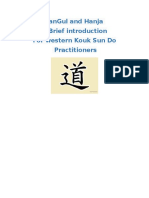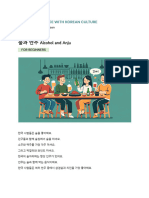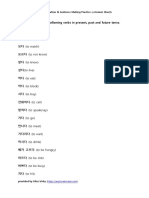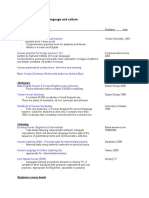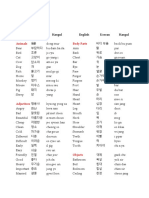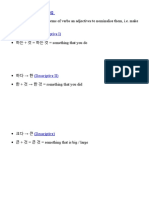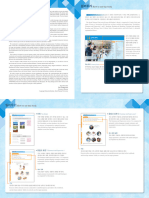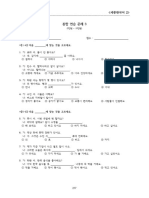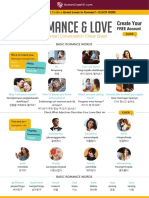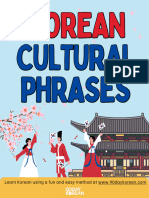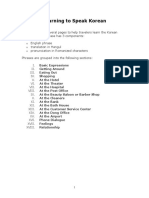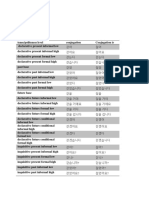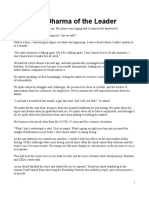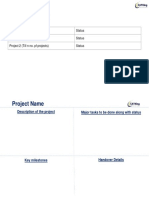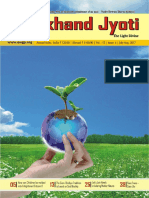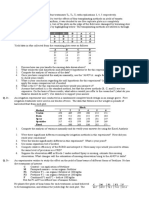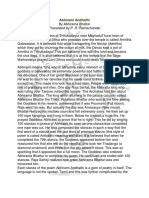Korean
Cultural Centre Australia
Ground fl, 255 Elizabeth Street Sydney NSW 2000
sejong@koreanculture.org.au / 02 8267 3400
Korean Language Class Syllabus
‐ King Sejong Institute, Korean Cultural Centre ‐
Class Level Sejong Korean 1‐1
Textbook Sejong Korean 1
Students are familiarized with the Korean Alphabet and the basic Korean
language structure so as to read and understand simple written text, and express
Objectives
oneself in written Korean. Achieve everyday basic communication ability such as
introducing oneself, daily life, asking location and shopping.
Week Theme Vocabulary Grammar Activities
1 한글, 기본 인사 Basic Insa 이/가 Pair work
활동 1-이름 묻기 Name 이에요/예요 Class interview
Hangeul, Basic Insa
Asking name
2 모음 1, 자음 1 Writing activity
Vowels1, Consonants1 Reading game
3 자모결합 Sino-Korean numbers 이/가 Writing activity
활동 2-전화번호 묻기 이에요/예요 Reading activity
Syllables Class interview
Asking phone number
4 모음 2, 경음 Writing activity
Vowels2, Double Reading activity
consonants Pair work
5 받침 음식 -아요/어요 Writing activity
활동 3-주문하기 Food -(으)세요 Role Play
Batchim
Ordering food
6 Unit 1 자기소개 국적, 직업 이에요/예요 Class Interview
Self-Introduction Nationalities, 은/는 Class activity
Occupations
7 Unit 2 일상생활 동작, 장소 -아요/어요 Group work
Daily Life Action, Places -에 가다 Class activity
8 Unit 3 위치 물건, 위치 이/가 Class activity
Location Objects, Locations 에 있다/없다 Pair work
9 Unit 4 물건 사기 1 쇼핑할 물건, 한자어 을/를 Class activity
Shopping1 수 -(으)세요 Role Play
Things to buy, Sino-
Korean numbers
10 Unit 5-1 물건 사기 2 고유어 수 -ㅂ니다/습니다 Role Play
Shopping2 Native Korean -ㅂ니까/습니까
Numbers
11 Unit 5-2 물건 사기 2 단위 명사 하고 Pair work
Shopping2 Counter nouns
12 Review End of term
End of term test test
1
� Korean Cultural Centre Australia
Ground fl, 255 Elizabeth Street Sydney NSW 2000
sejong@koreanculture.org.au / 02 8267 3400
Korean Language Class Syllabus
‐ King Sejong Institute, Korean Cultural Centre ‐
Class Level Sejong Korean 1‐2
Textbook Sejong Korean 1
Students can understand and express content based on their daily and personal
life such as yesterday’s daily routine, describing weather, time, making an
Objectives appointment, expressing weekend activities and plan, studying Korean and
explaining plan. During this course, students will be able to ask and answer
simple questions with basic vocabulary and expressions.
Week Theme Vocabulary Grammar Activities
1 Unit 6-1 어제 일과 동작 -았/었- Class Interview
Yesterday’s daily routine Actions
2 Unit 6-2 어제 일과 장소 에서 Pair work
Yesterday’s daily routine Places Class Interview
3 Unit 7-1 날씨 계절 그리고 Class Interview
Weather Seasons
4 Unit 7-2 날씨 날씨 안 Pair work
Weather Weather Class Interview
5 Unit 8-1 시간 날짜와 요일 에 Class Interview
Time Dates and days of the
week
6 Unit 8-2 시간 시간 표현 -시 –분 Class Interview
Time Time
7 Unit 9-1 약속 약속하기 -(으)ㄹ까요 Role Play
Appointments Making appointments
8 Unit 9-2 약속 약속의 내용 -아요/어요 pair work
Appointments Plans
9 Unit 10 주말 활동 장소, 주말 활동 그래서 Pair work
Weekend activities Places, Weekend -(으)ㄹ 거예요 Class activity
activities
10 Unit 11 한국어 공부 반대어, 시간 표현 내/제 Class Interview
Studying Korean Antonym, Time Pair work
Writing activity
11 Unit 12 계획 계획 Pronoun Speaking
Plans Plans 이/그/저 + activity
것(thing) Group activity
12 Review End of term
End of term test test
2
� Korean Cultural Centre Australia
Ground fl, 255 Elizabeth Street Sydney NSW 2000
sejong@koreanculture.org.au / 02 8267 3400
Korean Language Class Syllabus
‐ King Sejong Institute, Korean Cultural Centre ‐
Class Level Sejong Korean 2‐1
Textbook Sejong Korean 2
Students are introduced to modern Korean to develop an ability to use the
language in basic communication in Korean including asking about regards and
recent conditions, talking about hobby, explaining about food and taste, talking
Objectives
about transportation, asking and giving directions, talking on the phone,
describing people’s outfit and expressions commonly used in everyday life in
Korean as well as cultural aspects.
Week Theme Vocabulary Grammar Activities
1 안부 / 근황
Unit 1. 안부 -고 Interview
Regards, Recent
Greetings 그런데 Group work
conditions
2 Unit 2. 취미 활동 취미 / 빈도 못 Pair work
Hobbies Hobby, Frequency -아서/ 어서 interview
3 Unit 3. 음식 음식 / 맛 - (으)ㄹ 래요 Pair work
Food Food, Taste 무슨 Role play
4 Unit 4. 교통 교통수단 이/가 걸리다 Group work
Transportation Transportation Interview
5 Unit 4. 교통 교통수단 이용 .. 에서 ..까지
Transportation Verbs related to Pair work
transportation Interview
6 Unit 5. 길 찾기 방향 (으)로 Group work
Getting Directions Directions Writing activity
7 Unit 5. 길 찾기 이동 - 아서/어서 Pair work
Getting Directions Movement Group work
8 Unit 6. 전화 전화 -아/어 주다 Group work:
Telephone Telephone Role play
9 Unit 6. 전화 통화표현 - 지요 Group work:
Telephone Expressions used in a Interview
telephone conversation
10 Unit 7. 외모 외모 - (으)ㄴ Pair work
Appearance Appearance interview
11 Unit 7. 외모 옷차림 - 고 있다 Pair work
Appearance Outfits Role Play
12 Review Review
End of term test End of term
test
3
� Korean Cultural Centre Australia
Ground fl, 255 Elizabeth Street Sydney NSW 2000
sejong@koreanculture.org.au / 02 8267 3400
Korean Language Class Syllabus
‐ King Sejong Institute, Korean Cultural Centre ‐
Class Level Sejong Korean 2‐2
Textbook Sejong Korean 2
Students are introduced to modern Korean to develop an ability to use the
language in basic communication in Korean including introducing their family,
honorific expressions, talking about their trips and party, introducing their
Objectives hometown, expressing their emotions, talking about their future plans and
expressions commonly used in everyday life in Korean as well as cultural aspects.
During this course, students should be able to develop their communication skills
in Korean through various speaking, reading and writing activities.
Week Theme Vocabulary Grammar Activities
1
Unit 8 가족 가족 / 존대 표현 -의 Interview
Family Honorific expressions - (으)시 Pair work
2 Unit 9. 여행 여행지 특징 아/어 보다 Pair work
Trips Tourists’ characteristics - 고 싶다 Role Play
3 Unit 10. 건강 몸 Body - 지 마세요..
Pair work
Health
Role Play
4 Unit 10. 건강 건강 상태 - (으)ㄴ 후에
Pair work
Health Health conditions
Interview
5 Unit 11. 모임 모임에 필요한 것들 아야/어야 하다
Gathering Things needed for a 아야/어야 되다 Pair work
gathering Interview
6 Unit 11. 모임 모임 준비 - (으)ㄹ게요
Gathering Preparing for a gathering
7 Unit 12. 고향 장소 묘사 - 지만
Pair work
Hometown Describing a location 1
Group work
8 Unit 12. 고향 장소 묘사 A가 B 보다 더..
Group work:
Hometown Describing a location 2
Interview
9 Unit 13 기분 Feelings - (으)ㄹ 때 Group work:
기분과 감정 Interview
Feelings and emotions
10 Unit 13 기분 전환 Refreshment - (으)러 가다 Pair work
기분과 감정 Speaking and
Feelings and emotions reading activity
11 Unit 14 미래 한국어를 배우는 이유 VST (으)려고 Interview
Future Reasons you study Korean - (으)면 Pair work Writing
희망 사항 Wishes activity
12 Review Review
End of term test End of term test
4
� Korean Cultural Centre Australia
Ground fl, 255 Elizabeth Street Sydney NSW 2000
sejong@koreanculture.org.au / 02 8267 3400
Korean Language Class Syllabus
‐ King Sejong Institute, Korean Cultural Centre ‐
Class Level Sejong Korean 3‐1
Textbook Sejong Korean 3
Students are introduced to modern Korean to continue developing an ability to
use the language in basic communication in Korean including talking about
Objectives
occupations, holiday plans, things you like to do, and expressions involved in
celebrations, housework and shopping.
Week Theme Vocabulary Grammar Activities
1 Unit 1 Occupations and jobs Noun 이/가 아니다 Pair work
Occupation VST-는
2 Unit 2 Sports and hobbies Noun(이)나 Class interview
Things you like VST-는 것 Pair work
3 Unit 3 - How to celebrate VST-(으)니까 Pair work
Celebration - When to celebrate Noun 에게
4 Unit 4-1 - Housework AVST-고 있다 Pair work
Work to do - Work to do
5 Unit 4-1 - Housework VST-기가 Pair work
Work to do - Work to do 싫다/힘들다/쉽다/어렵다 Class activity
6 Unit 5-1 - Period -동안 Pair work
Holiday plan - Things you do in holiday Class activity
7 Unit 5-2 - Period -기로 하다 Class interview
Holiday plan - Things you do in holiday Pair work
8 Unit 6-1 -Colours and shapes Noun 말고 Pair work
Shopping -Evaluation
9 Unit 6-2 -Colours and shapes -는/(으)ㄴ 것 같다 Class activity
Shopping -Evaluation Pair work
10 Unit 7-1 - Preparation -(으)ㄹ 수 있다/없다 Pair work
Travel and visit - Things you do when Class Interview
you travel
11 Unit 7-2 - Preparation -(으)ㄴ Pair work
Travel and visit - Things you do when Group work
you travel
12 Review End of term
End of term test test
5
� Korean Cultural Centre Australia
Ground fl, 255 Elizabeth Street Sydney NSW 2000
sejong@koreanculture.org.au / 02 8267 3400
Korean Language Class Syllabus
‐ King Sejong Institute, Korean Cultural Centre ‐
Class Level Sejong Korean 3‐2
Textbook Sejong Korean 3
Students are introduced to modern Korean to continue developing an ability to
use the language in basic communication in Korean including expressions
Objectives
involved public etiquette, life style, describing objects and its location, asking
favours, and talking about where you want to live in and dream.
Week Theme Vocabulary Grammar Activities
1 Unit 8-1 Things you should and -(으)면 안되다 Pair work
Public etiquette should not in public Group work
2 Unit 8-2 Things you should and -아도/어도 되다 Group work
Public etiquette should not in public
3 Unit 9 Good and bad habit Noun 마다 Pair work
Lifestyle -기 전에
4 Unit 10-1 Describing objects and VST-(으)ㄹ 거예요 Class activity
To find things status Pair work
5 Unit 10-2 Describing objects and -아/어 있다 Pair work
To find things status
6 Unit 11 Weather DVST-아/어지다 Pair work
Weather VST-네요 Group work
7 Unit 12-1 When and what you ask a AVST-아/어 줄래요? Group work
Asking a favour favour Pair work
8 Unit 12-2 When and what you ask a VST-는데/(으)ㄴ데 Group work
Asking a favour favour Pair work
9 Unit 13-1 House condition VST-았으면/었으면 Pair work
House you want to live 좋겠다
in
10 Unit 13-2 House condition VST-거나 Pair work
House you want to live Class Interview
in
11 Unit 14 Reasons to have dreams VST-기 때문에 Pair work
Dream and determination -겠- Class activity
12 Review End of term
End of term test test
6
� Korean Cultural Centre Australia
Ground fl, 255 Elizabeth Street Sydney NSW 2000
sejong@koreanculture.org.au / 02 8267 3400
Korean Language Class Syllabus
‐ King Sejong Institute, Korean Cultural Centre ‐
Class Level Sejong Korean 4‐1
Textbook Sejong Korean 4
Students are introduced to modern Korean to continue developing an ability to
use the language in basic communication in Korean including describing
Objectives personalities, talking about living abroad, how to invite/accept/refuse, talking
about their resolutions and expressions involved in table manner, expressing
gratitude and how to use public facilities.
Week Theme Vocabulary Grammar Activities
1 Unit 1 - Recent life VST-(으)면서 Pair work
Recent life - Describing person and VST-게
personality
2 Unit 2 - Living abroad VST –(으)ㄴ 지 Class interview
Living abroad - Life and feelings VST-게 되다 Pair work
3 Unit 3-1 How to invite VST-(으)ㄹ까 하다 Group work
Invitation
4 Unit 3-2 How to accept and refuse VST -거든요 Class activity
Invitation
5 Unit 4 - Purposes of resolutions VST -기 위해서 Pair work
Resolution - Things to accomplish Noun 에 Class activity
6 Unit 5-1 Table manner 은/는 Pair work
Cultural difference Class activity
7 Unit 5-2 Living culture VST-는데/(으)ㄴ데 Pair work
Cultural difference Group work
8 Unit 6-1 How to thank VST-(으)ㄴ 덕분에 Pair work
Appreciation
9 Unit 6-2 How to thank Noun-밖에 Class interview
Appreciation Pair work
10 Unit 7-1 How to use public facilities VST-는지/(으)ㄴ지 Pair work
Public facilities 알다/모르다 Class activity
11 Unit 7-2 How to use public facilities VST-(으)려면 Class activity
Public facilities Pair work
12 Review End of term test Test
7
� Korean Cultural Centre Australia
Ground fl, 255 Elizabeth Street Sydney NSW 2000
sejong@koreanculture.org.au / 02 8267 3400
Korean Language Class Syllabus
‐ King Sejong Institute, Korean Cultural Centre ‐
Class Level Sejong Korean 4‐2
Textbook Sejong Korean 4
Students are introduced to modern Korean to continue developing an ability to
use the language in basic communication in everyday life including how to make
Objectives
reservations, talking about their experiences and feelings, and expressions
involved in cooking and describing recipes.
Week Theme Vocabulary Grammar Activities
1 Unit 8-1 How to book VST-( 으)시겠습니까? Group work
Reservation
2 Unit 8-2 How to book VST –(으)려고 하다 Class activity
Reservation
3 Unit 9-1 Incidents VST-(으)ㄴ 적이 Pair work
Experience 있다/없다 Class activity
4 Unit 9-2 Feelings VST-는 동안 Pair work
Experience Class activity
5 Unit 10 - Ingredients - Noun-(으)로 Pair work
Cooking - How to cook - VST-고 나서 Group work
6 Unit 11-1 Movie & Drama - Noun 같이 Pair work
Movie and drama Class Interview
7 Unit 11-2 Reasons to be popular - VST 잖아요 Pair work
Movie and Drama Class Interview
8 Unit 12-1 Clothes - Noun 에다가 Pair work
Fashion Accessories Class Interview
9 Unit 12-2 Fashion taste - VST-는/(으)ㄴ 편이다 Pair work
Fashion Class Interview
10 Unit 13 Personalities - VST-아/어 해 보이다 Pair work
Personality Disposition - VST-(으)ㄹ 것 같다 Group work
11 Unit 14 Study - 얼마나 VST- Pair work
Impression Compliment 는지/(으)ㄴ지 모르다 Class avtivity
- VST-기는요
12 Revision Test
End of tem test
8
� Korean Cultural Centre Australia
Ground fl, 255 Elizabeth Street Sydney NSW 2000
sejong@koreanculture.org.au / 02 8267 3400
Korean Language Class Syllabus
‐ King Sejong Institute, Korean Cultural Centre ‐
Class Level Conversation in Korean
Textbook Handouts and relevant materials to be provided by the teacher
This course is speaking practice oriented course, which is designed to enable
students to improve their speaking skills and promote discussion on a wide
Objectives
variety of topics. Students will also continue to develop their power of practical
expressions and conversations in Korean.
Week Theme Activities
1 여행 경험 (Travel Experience) Class and group discussion
‘해밀턴 아일랜드에 가려고 하는데 어디에 가볼만해요?’
2 첫인상 (First Impression) Pair and class talk
‘제가 낯을 가리는 편이라 오해를 많이 받아요.’
3 나라 소개 (Introduction of your country) Class and group discussion
‘호주하면 알다시피 오페라하우스로 유명하죠.’
4 나라에 따른 다른 문화 (Different cultures in different Class and group discussion
countries)
‘한국은 호주와 달리 설날에 세뱃돈을 받는다면서요?’
5 자연 재해 (Natural Disaster) Group discussion and class debate
‘어제 일본에서 또 지진이 났대요.’
6 환경 문제 (Environmental Problems) Group discussion and class debate
‘텀블러 사용으로 숲을 만들어요.’
7 연애와 결혼 (Love, Dating & Marriage and Weddings) Group talk and class discussion
‘누가 먼저 고백했어요?’
8 이별 ( Farewell & Parting) Group and class talk
‘5 년 넘게 사귀던 사람하고 얼마전에 헤어졌어요.’
9 관용 표현 (Korean idiomatic expressions) Group discussion
‘저는 너무 귀가 얇아서 큰일이에요.’
10 대중문화 (Pop Culture) Pair talk and group discussion
‘이 영화가 올해의 기대작이래.’
11 소문 (Rumor & Gossip) Pair and class talk
‘벌써 소문이 쫙 퍼져서 모르는 사람이 없어.’
12 End of term test Speaking Test
9




